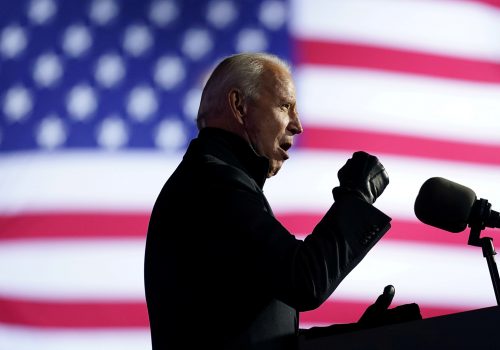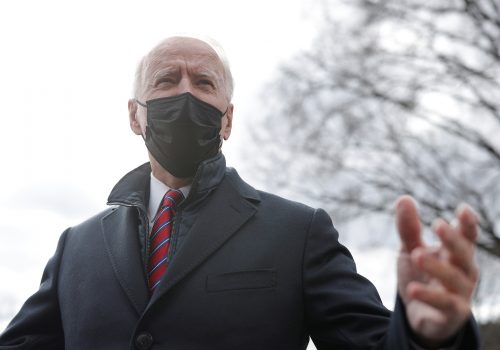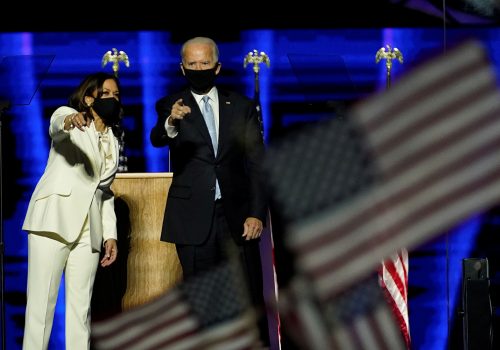The big takeaways from Biden’s first foreign-policy speech
“Diplomacy is back.”
That’s how President Joe Biden greeted staff at the State Department before delivering the first foreign-policy address of his presidency on Thursday. He vowed a return to working together with allies, pledging that his administration will strengthen relationships that had “atrophied” under Donald Trump. He promised to re-engage with international institutions like the World Health Organization, stating that the world’s most pressing challenges—from the climate crisis to the pandemic—“will only be solved by nations working together in common cause.” He vowed to be tougher on Vladimir Putin. And he announced an end to controversial US backing for the Saudi-led war in Yemen.
Biden campaigned on a promise of renewed American engagement with the world after the era of “America First”—and the president’s remarks were designed to show that this shift is already underway.
So did the message resonate? And what are the big tasks ahead? We turned to the Atlantic Council’s experts for their reactions.
Barry Pavel, senior vice president and director of the Scowcroft Center for Strategy and Security
“President Biden succeeded in firing the first shot of a renewed American foreign policy for the 2020s that is tethered to two core American interests. The first is to directly advantage the US middle class by providing jobs and prosperity through equitable trade agreements and rebuilding at home. The second is to protect US national security by once again placing America’s alliances, which he called “our greatest asset,” as a top priority. Thus, he has begun to reset the tone of American engagement in the world. Now comes the real work of making tough strategic choices, particularly relating to the development of a strategy by the United States and its allies for China.”
Christopher Skaluba, director of the Transatlantic Security Initiative
“Biden’s foreign-policy speech was remarkable for its aggressive normalcy, or at least what we thought of as normal before 2016. Themes of diplomacy, cooperation, and alliances will be welcome words to allies and partners in Europe and beyond. As will unmistakably tough talk on Russia (and in a more careful way, China), a commitment to battle climate change, and a decision to freeze US troop deployments from Europe. Nevertheless, the unfortunate foreign-policy legacy of the last administration haunted the speech, forcing Biden to recognize the need to reclaim a mantle of trust, both at home and abroad. Missing was any talk about the significant resources—in time, money, and attention—needed to rebuild American credibility, leaving questions about how much can be done, how quickly, and with what priority.”
Christopher Preble, co-director of the New American Engagement Initiative
“The professionals at the State Department surely welcomed President Biden’s call for ‘leading with diplomacy.’ But he must set priorities, and America’s global ambitions must be tempered by humility. Every foreign-policy decision, as National Security Advisor Jake Sullivan explained in November, ‘should be judged by a basic question—will this make life better, easier, safer for families across this country?’ And stopping the COVID-19 pandemic, restoring the US economy, and healing the nation’s internal divisions must be at the top of the Biden team’s agenda.”
Kirsten Fontenrose, director of the Scowcroft Middle East Security Initiative
“Announcing a special envoy for Yemen right before announcing the end of the Defense Department’s support to the Saudi-led coalition engaged in fighting [in the country] and an end to related arms sales is a carefully constructed message by the administration that the US will keep skin in the game, but swap out military assistance for diplomatic effort. The clear statement of commitment to Saudi Arabia’s security is meant to reassure the Gulf; prevent emboldening the Houthis and Iran; and quell the air strikes Saudi Araba is likely to conduct in response to continued Houthi attacks, which would be more lethal to civilians without US assistance on target deconfliction.”
William Wechsler, director of the Rafik Hariri Center and Middle East Programs
“The only announcement related to the Middle East and North Africa was about Yemen. Here President Biden followed through on several important campaign promises: to work to end the war, to help address the humanitarian crisis, to stop US military support to Saudi operations, and to work with the UN and re-emphasize diplomacy, which he did by naming Tim Lenderking, a highly respected professional diplomat, as the US special envoy. But equally important was the president’s careful wording to only restrict support to ‘offensive’ operations and ‘relevant’ arms sales, while recognizing that Saudi Arabia is threatened by ‘missile attacks’ and ‘UAV strikes’ from ‘Iranian-supplied forces’ in ‘multiple countries.’ The measured language offered balanced perspectives, a far cry from what we heard on the campaign trail about Saudi Arabia, and bodes well for the upcoming strategic review of US-Saudi relations. The substance of that review is expected to be challenging enough; it’s an encouraging sign that both sides are approaching it without using overheated and undiplomatic statements. After four years of the Trump administration’s brand of diplomacy dominated by tweet, threat, and insult, it’s a real pleasure to see professionalism once again.”
John Herbst, director of the Eurasia Center
“Biden’s foreign-policy speech covered briefly the main points of his approach toward Russia and was consistent with his statements as a candidate and his activities since entering the Oval Office. He stressed that the US would not ‘roll over’ when Moscow takes aggressive measures that threaten American interests and that the US can counter such measures best when working with its allies and partners. The president also reiterated his support for the unjustly imprisoned Alexei Navalny and for the tens of thousands of demonstrators across Russia who have faced police batons and imprisonment. At the same time, Biden reiterated his willingness to negotiate and work with Russia on critical issues like weapons of mass destruction. The new administration’s balanced approach is welcomed warmly by our friends and sets the stage properly for dealing with a frisky Kremlin.”
Miyeon Oh, director of the Asia Security Initiative
“How the Biden administration handles the military coup in Myanmar will likely provide an early test of his promise to practice a democracy-focused diplomacy and work constructively with US allies to fight authoritarianism. In calling US-China relations a rivalry, President Biden implicitly placed China at the center of such authoritarian regimes—as a target for the US to confront in restoring democracy and human rights. The Biden administration still needs to present its China policy more clearly and in greater detail, particularly in terms of distinguishing between areas of common and conflicting interests with Beijing.”
Jason Marczak, director of the Adrienne Arsht Latin America Center
“Biden’s address clearly showed the new direction that American foreign policy will take under his leadership. As the president said, ‘America’s alliances are our greatest assets.’ In our own hemisphere, those alliances will be pivotal for reasserting US support for its partners and in helping Latin America and the Caribbean recover from the pandemic and its socioeconomic effects. The message of ‘America is back’ will resonate with partners and adversaries throughout the hemisphere. The president is quickly getting to work in addressing Central America as well—where sustainable solutions were ignored by his predecessor. His executive order outlining a vision for a regional framework to address the root causes of migration is a welcome and logical step.”
Josh Lipsky, director of programs and policy at the GeoEconomics Center
“Today, the president reminded the world that securing a stronger economy at home is the first part of any successful foreign policy. The speech swept away the worn notions of a divide between foreign policy and domestic policy. Biden understands that with a fractured US economy none of his foreign-policy objectives—on climate, on COVID, on China—will be achievable. But he also recognized the inherent tension of this approach when it comes to trade and manufacturing. Protecting American workers while simultaneously rebuilding alliances and trade relationships will be a test of the vision laid out today.”
Rose Jackson, director of the Policy Initiative at the Digital Forensic Research Lab
“President Biden doubled down on the inextricable links between American strength and stability at home and the US role abroad—asserting that foreign policy and domestic policy in this administration will be interconnected and interdependent. There are few issues in which these links are more important than technology and its impact on democracy. Biden’s reference to the creation of a ‘cyber and emerging technology’ deputy national security advisor is a helpful start. The most important message is that ‘technology’ means more than cybersecurity—and US domestic regulation would have major geopolitical implications.”
Emerson Brooking, senior fellow at the Digital Forensic Research Lab
“President Biden’s first foreign-policy speech cements information integrity and cybersecurity as a major focus on US strategy over the next four years. He calls out Russia’s election interference and promises a robust US response. He speaks to changes in his National Security Council that will enable quick responses to cyber-related challenges. It is clear that Biden and his advisors understand that effective public diplomacy and control of the digital commons will determine the fate of many US foreign-policy initiatives. This is refreshing to see.”
Julian Mueller-Kaler, resident fellow at the GeoTech Center and Foresight, Strategy, and Risks Initiative in the Scowcroft Center for Strategy and Security
“By appointing the first deputy national security advisor for cyber and emerging technologies, the Biden administration is elevating these topics to the highest levels of decision-making. Whether in the competition with China, a successful pandemic response, or transatlantic dialogue on privacy and data collection, AI and other emerging technologies are affecting every aspect of today’s foreign policy. The new administration seems to realize this and plans to give the geopolitical nature of technology the attention and appreciation required.”
Randolph Bell, director of the Global Energy Center
“President Biden once again included climate change in the top priorities for his administration, though it was already clear this would be a top foreign-policy issue for him with the appointment of John Kerry as special presidential envoy for climate. It was perhaps more important that he situated international climate action in a speech that at its core was about the return of American diplomacy—an approach that suggests negotiation and compromise, not hardline stances. This approach is already taking shape. On Sunday, Kerry spoke with Sultan Al Jaber, the United Arab Emirates’ climate envoy and CEO of the Abu Dhabi National Oil Company. Instead of shunning the representative of this major hydrocarbon producer, an outcome some activists might prefer, the two envoys discussed working together to lower global emissions. With the acute need for emissions reductions, this approach may not be enough. But it might also be the approach that produces the best possible outcomes given the political and economic realities of climate action.”
Further reading
Image: U.S. President Joe Biden delivers a foreign policy address as Vice President Kamala Harris listens during a visit to the State Department in Washington, U.S., February 4, 2021. REUTERS/Tom Brenner


